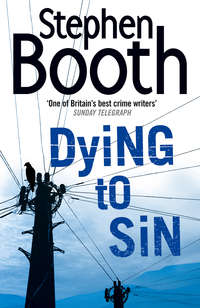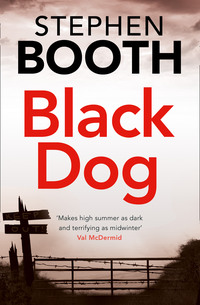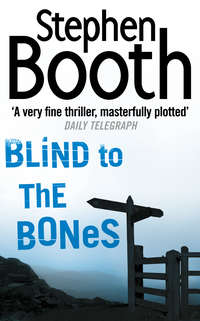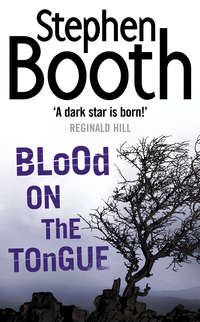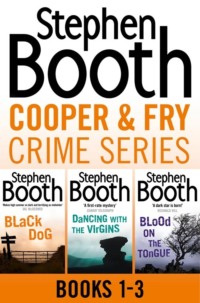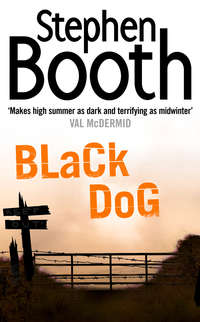
Полная версия
Lost River
‘When we get a cold case hit, we consult the CPS before we consider intruding into a victim’s life. We have to take a close look at how strong a case we’ve got, and whether we can do something to strengthen it.’
‘With the help of the victim.’
‘Of course. And in this case…’
‘In my case. This is personal. Don’t try to pretend it isn’t.’
‘In your case, we had a very credible witness report from the victim. From you, Diane. Everything is on file for this one. We have an e-fit record in the imaging unit, and a copy of everything has been kept by the FSS. But the bottom line is, we got a DNA match.’
DNA, the holy grail of trace evidence. The national DNA database had gone live in 1995 and every week now the Forensic Science Service laboratory in Birmingham matched more than a thousand profiles taken from crime scenes, solving crimes up to thirty years old. Soon, the database would hit its target of three million profiles.
It was so easy to believe that DNA evidence was foolproof. Yet the larger the database, the greater the chance of somebody being wrongly linked to a crime. For some, it was too much like the beginnings of a Big Brother society they didn’t really want to be part of.
‘The time is now,’ said Branagh. ‘Do we have a decision?’
‘Yes, ma’am.’
‘Excellent. I’m granting you indefinite leave of absence.’
Branagh made a note in a file on her desk.
‘Of course, since we don’t know how long you’ll be away from the division, there’ll be an appointment to Acting DS in your place.’
Leaving Branagh’s office, Fry pulled out her mobile and dialled a number.
‘Dad? Will you be at home tomorrow? Yes. I’m coming to see you.’
Ben Cooper turned right and dropped the Toyota down a gear to go up the steep street. Edendale was one of only two towns that sat within the boundaries of the Peak District National Park. At Buxton and other towns, the line on the map took wide sweeps around them and back again, to exclude them from national park planning restrictions. But Edendale sat too deep within the hills to be excluded. It lay in the middle of a valley running west to east, halfway between the Hope and the Wye. The River Eden came down from the hills and meandered its way through the town before escaping to the east. Because of its position, every road in the town led upwards, out on to the moors.
Castleton Road climbed past close-packed residential areas that spiralled up the hillsides, houses lining narrow roads that took sudden twists and turns to follow the humps and hollows of the underlying landscape. Further out, the houses became newer as they got higher, though they were built of the same stone. Finally, the housing petered out in a scattering of small-holdings and small-scale dairy farms.
For the moment, Edendale was constrained in its hollow by a barrier of hills. But the pressure of housing demand might force it to expand some time – either southwards into the gentle limestone hills of the White Peak, or north towards the bare gritstone moors of the Dark Peak.
By the river in the centre of town, the Buttercross area was where Edendale’s antique shops clustered. This was the oldest and most picturesque part of the town, including Catch Wind and Pysenny Banks, where the stone-walled streets were barely wide enough for a car and the river ran past front gardens filled with lichen-covered millstones.
In this area, his sister Claire’s shop stood empty now, the ‘To Let’ signs up, and all its stock sold off. There wasn’t much hope of a sale at the moment. It was hardly the only empty shop in town anyway. Time moved a bit more slowly here than in other parts of the country, and the recession had come along late, its ripple effects hitting the Eden Valley some months after the stone that had been dropped into the water of the UK economy.
At the height of the recession, twenty per cent of retail property had stood vacant in the city of Derby. In the north of the county, smaller market towns like Edendale had survived for a while on their tourism business – thanks to all those people who’d decided to spend their holidays in Britain rather than fly to the Maldives. And now, while the papers talked about the green shoots of recovery, the shutters were still up in Edendale’s High Street.
But Claire Cooper was ready to make a fresh start. She was a ‘glass half-full’ sort of person, and saw it as an opportunity. Even Matt might be pushed and cajoled into adopting a more optimistic outlook than he’d expressed for a long time.
At E Division, Gavin Murfin would be retiring in a few years’ time, finally able to claim a full pension at the end of his thirty years’ service. Gavin’s eldest was due to get married soon. He’d probably be a grandfather before long. But what would he do with himself in his mid-fifties, a career in Derbyshire Constabulary behind him, and too much time on his hands? It was funny how that happened in someone’s life. Time turned them into a person their friends didn’t recognize and had no connection with. Old colleagues who’d depended on each other’s support for years suddenly found they had nothing in common, no way even of sharing the office gossip. You couldn’t talk about work to a civilian. And all of that could be a brutal wrench for some officers. Too cruel a rupture.
Cooper had a sudden vision of himself in twenty years’ time, overweight and middle-aged, slouching around the CID room at Edendale, checking his watch to see if it was time to go home yet, setting a bad example for the younger DCs, grumbling about always missing out on promotion. He could become another Gavin Murfin.
No, surely not.
But some things never changed. Every division was still struggling to meet all its targets. Sanctioned Detection Rate, Crime Reduction Figures, PDR Completion Rate, Public Confidence Measure. The list seemed endless and unattainable.
Number 8 Welbeck Street lay just across the river from the town centre, close enough for him to walk to work if he wanted to. It benefited from a conservatory, and long gardens between Welbeck Street and the shops on Meadow Road. Unfortunately, his landlady Mrs Shelley, who lived next door, was becoming dottier and dottier, and he wasn’t sure how long he had left before her acquisitive relatives took over the two houses. No doubt they had their own plans.
He did still have a cat, though. Not the original black moggy who had come with the ground-floor flat as a sitting tenant. The poor chap had died one night in his sleep, and the flat had felt very empty without him.
Cooper’s new cat had chosen him one day when he visited the Fox Lane animal sanctuary. She had hooked him with her claws as he passed her cage, and refused to let go. One look into her anxious bright green eyes had left him with no option.
Now she was very much at home in Welbeck Street, enjoying the freedom of roaming the back gardens. He was gradually getting used to seeing tabby stripes instead of long black fur.
It had taken him ages to name the new cat. Naming an animal seemed such a simple thing. It wasn’t like choosing a name for a child, when something that suited a gurgling baby also had to be cool enough to avoid bullying when a child reached its teens, and appropriate for a responsible adult who didn’t want to sound like a porn star.
Claire had told him that a cat was the Celtic equivalent to the mythical two-headed dog Cerberus, the guardian at the entrance to the Underworld. So he’d toyed with some names from Celtic mythology. Brigid, Mari, Morgan, Rhiannon. Wikipedia had come up with a whole list. But none of them had seemed right. They sounded too much like witches.
He’d decided that the name ought to represent something of the area, the landscape that meant so much to him. Living in town, he missed the countryside, particularly his old home at Bridge End Farm. It ought to be something that reminded him of good things, the name of a hill or valley. Not a bleak peat moor from the Dark Peak, but something gentler.
The answer had come to him as he sat looking at the cat, gazing into her green eyes. He had an image of the wonderful panorama from Surprise View above Hathersage. It was a view that summed up the Peak District. On one side was the edge of the Dark Peak, with its twisted gritstone tors and the ramparts of Carl Wark. On the other side lay the White Peak, densely wooded slopes, limestone dales, picturesque villages. Ahead, there was a view right up the valley to Castleton, and on the horizon the hump of Mam Tor, the shivering mountain. The Hope Valley. Perfect. Now his cat was called Hope.
Cooper’s phone chirped. He’d finally bought an iPhone, though it was a cheap one he found on eBay. He spent far more time playing with it than he ought to. He’d turned it to vibrate while he was with the Nields. Now there were lots of messages waiting for him. One was from his brother, Matt.
‘Ben, can you call? I need to talk to you about something. It’s…well, it’s a bit of a family problem. So call, can you? Or come to the farm.’
Then there was a spell of silence before the call ended. No, not actually silence. If he pressed his ear to the phone, he could hear the sounds of the farm in the background. A dog barking, birds singing, cows lowing like a stage chorus as they headed in for milking. He pictured Matt crossing the yard behind the herd, forgetting that he had the phone clutched in his huge hand as he shoo’d an awkward beast through the gate. Cooper could have listened to it for ever. But finally there was a faint curse, and dead air.
And there was Liz. A voicemail message, simply to say Hi, Ben. Did you get my text? Love you.
No call from Diane Fry, which was unusual. No last-minute instructions, telling him how to do his job while she was away.
He wondered what the problem was with Matt. Or with the family. That was what he’d said. That meant Kate – or more likely one of the girls, Amy and Josie. Matt was forever worrying about them, fretting over how they were doing at school, and what sort of friends they were making. Last time, it had been some concern about the youngest, Josie, just because she had an imaginary friend and talked to herself a bit. Then, Matt had convinced himself she was in the early stages of schizophrenia, the illness her grandmother had suffered from for so long. But that seemed to have passed over now, so it must be something else.
Well, he would find out sooner or later.
A beep announced another text coming in.
‘Oh, for God’s sake –’
Cooper breathed deeply, surprised by his sudden burst of irritation. His anger had no apparent target. It was just a text message. But the sound of the beep had been enough to cause a momentary surge of temper, a flush that passed rapidly across his temples. He took a few more breaths to calm himself, and checked his phone.
It was Liz again. That would be the fifth or sixth text from her today. Some people had nothing better to do with their thumbs.
The previous text had said: CU 2nite? xox
Liz had gone on to Twitter, too. Cooper suspected she was getting a bit obsessed with it. Sometimes, when he was with her in the pub, she would tweet on her mobile phone. Just to let her friends know that she was…well, with him.
The new text said: so? 2 busy? :o
Cooper thought that when they invented the English language, they should have included punctuation marks to indicate irony and sarcasm, instead bothering with stuff like semi colons, which no one ever used. Subtleties of tone were completely lost in a text message. It was so hard to tell what mood someone was in when their voice was inaudible.
Recently, Liz had been complaining that he was always too busy with work. She was a civilian Scenes of Crime officer, recently transferred to B Division in Buxton, which meant they didn’t see each other in working hours any more. They’d been going out together for months now, and were pretty much considered a serious item. Marriage hadn’t been mentioned out in the open. Not yet, anyway. But she’d met his family, and he’d been for dinner with her parents in Bakewell. It felt like there was an irresistible impetus to their relationship, which could only end in one way.
The trouble was, when they did get engaged, he was pretty sure Liz would announce it first on Twitter.
Well, at least Liz didn’t blog, so far as he knew. Blogging was a minefield for a serving police officer. All over the country, bosses were getting paranoid after the chilling honesty and politically incorrect opinions of bloggers like Inspector Gadget and Night Jack. Attempts to preserve anonymity had been rejected by the High Court. A blog could get you into real trouble.
Cooper gave in to the psychological pressure and put down his phone to open a tin of Whiskas. Everyone had their own idea of priorities.
When Hope was satisfied, he poured himself a beer from the fridge and went back to his phone. He really didn’t feel like going out tonight. In fact, he felt so unwell that he might be coming down with summer flu or something. Swine flu, even. You never knew.
Sorry, wiped out. Tomorrow, ok? xxx
He knew it wouldn’t suit. He waited a while, sipping his beer and stroking the cat. But there was no reply, and finally he nodded off in front of the TV. He woke three hours later, realizing it was nearly bedtime.
‘This is no good, Hope.’
He lay awake that night, expecting flashbacks. He didn’t usually have trouble sleeping, the way he knew some of his colleagues did. It was those who lived alone that seemed to be unable to switch off from the job. A house full of kids didn’t give you any option, he supposed. A family around provided all the support and distraction you could need. Far better than a reliance on alcohol, or worse.
But that wasn’t his problem. It never had been before, except on rare occasions. So why was he lying here afraid to fall asleep, nervous of the dreams that might come in the darkness?
He had an appointment for a meeting with Superintendent Branagh in the morning. Now was not the time to suffer anxiety attacks.
Diane Fry knew she was only imagining the sirens. They were nothing more than a noise inside her head, an echo of the monotonous internal shriek that had been going on for days.
Mostly, during the daytime, she hardly noticed it. As long as she kept busy, and there were people around her, provided there were other sounds, the background din of normality…well, then she was fine. Absolutely fine. It was in the quiet moments that she heard it. Distant at first, like the high-pitched hum of an electric motor.
But gradually, it would grow nearer, forcing its way to the front of her mind, until the scream was loud enough to shatter her thoughts into fragments, like a glass splintered by a singer’s high note. Then her head would throb with the noise, until her brain banged against the inside of her skull and the pain was intolerable. Once her concentration was destroyed, she could think of nothing but the shriek, feel only its pounding. It took over her whole body. It had her at its mercy.
The nights were the worst, of course. Always the worst. Any bad thing that ever happened in her life – well, it was always a lot worse in the dark, in the cold hours before dawn, when the world seemed to recede into the darkness and leave her totally alone. Then she had to listen to the radio, turn on the TV for the Jeremy Kyle Show, anything…anything to avoid the silence. She had to drive that noise back into the distance.
Fry turned over, pumped her pillow. Well, she supposed the sirens could be real. Edendale wasn’t exactly crime free. More likely, though, it was some idiot who’d wrapped his car round a tree on the bend at the top of Castleton Road.
And then there were the voices. Voices that were coming gradually nearer. Right now, they were almost inaudible in the distance, like someone talking on the other side of a hill. She knew those voices would grow closer when she arrived in Birmingham. Then they would be too close. So close that they’d be right inside her head.
Immediately, she felt the sweat break out on her forehead. She cursed silently, knowing what was about to come.
Now that she was alone, the darkness would begin to close in around her, moving suddenly on her from every side, dropping like a heavy blanket, pressing against her body and smothering her with its warm, sticky embrace. Its weight would drive the breath from her lungs and pinion her limbs, draining the strength from her muscles.
Her eyes stretched wide, and her ears strained for noises as she felt her heart stumble and flutter, gripped with the old, familiar fear.
Around her, the night murmured with unseen things, hundreds of shiftings and stirrings that seemed to edge continually nearer, inch by inch, clear but unidentifiable. Next, her skin began to crawl with imagined sensations.
She had always known the old memories were still powerful and raw, ready to rise up and grab at her hands and face from the darkness, throwing her thoughts into turmoil and her body into immobility. Desperately, she would try to count the number of dark forms that loomed around her, mere smudges of silhouettes that crept ever nearer, reaching out to nuzzle her neck with their teeth and squeeze the air from her throat. Two, three…she was never sure how many.
And then she seemed to hear a voice in the darkness. A familiar voice, coarse and slurring in a Birmingham accent. ‘It’s a copper,’ it said. Taunting laughter moving in the shadows. The same menace all around, whichever way she turned. ‘A copper. She’s a copper.’
5
Tuesday
In the CID room at Edendale next morning, the rest of the team were already hard at work over their reports when Cooper arrived. DC Luke Irvine and DC Becky Hurst were at the desks closest to his, and they nodded to him when he came in, their eyes full of questions.
Irvine and Hurst were the newest members of E Division CID, and they made Cooper feel like a veteran now that he was in his thirties. After a few years as beat and response officers, they’d been rushed into CID. That was an indication of the shortage of experienced staff. An entire new generation was coming into the police service, all Thatcher’s children, born between 1979 and 1991. They had quite a different attitude to the older officers like Gavin Murfin.
They were eager to impress, too – anxious to get every last detail right in their reports and case files before their supervisor saw them. He had to give credit to Diane Fry for that. She had the new DCs with their noses to the grindstone. No one wanted to get on the wrong side of her.
Cooper supposed he might have been like Luke Irvine once, when he first got a chance to take off the uniform and work as a detective. Young and eager. How times had changed.
‘DC Cooper. I hear it was rather a disturbing incident yesterday. Are you all right?’
The sudden stir in the room was accounted for by the arrival of their DI, Paul Hitchens, and Superintendent Branagh. Cooper found Branagh looming over his desk dressed in a black suit and white blouse, like a funeral director. Her shoulders were broad enough to carry a coffin on her own, too.
Cooper stood up. ‘Yes, ma’am, thank you.’
‘Your line manager should make sure you defuse. I know you weren’t on duty, but even so. Then off to HR Service Centre – Care First, or a trained colleague supporter for a de-brief.’
‘No, really. Thank you, ma’am, but I’m fine.’
‘Well, everyone needs counselling services now and then. Perhaps a little leave? No? All right. Well done, anyway. Don’t forget – see me in my office at nine.’
When Branagh had left, DI Hitchens put his hand on Cooper’s shoulder.
‘You do have to be aware of the fallout, Ben.’
‘I’m sorry?’
‘The psychological fallout.’
‘Oh, I see.’
‘So don’t bottle it up. There are systems in place. Critical incident support. DS Fry should take care of it.’
Cooper nodded, accepting the good intentions, but hoping that no one would mention it again. Diane Fry had other things on her mind anyway.
‘They say it’s like falling off a horse,’ said Murfin a few minutes later.
‘What is?’
‘Trauma. Getting over a traumatic incident. The thing to do is go back and put yourself in the same circumstances again. It’s like when you fall off a horse – you have to get straight back on. Otherwise, you just get more afraid of doing it. It kind of builds up in your mind, the idea that you’ll fall off every time. If you leave it long enough, it turns into a proper phobia, like.’
Cooper felt a surge of irrational anger, as if Murfin’s comment was the final straw.
‘Gavin, you’re not a psychiatrist. You don’t know what the Hell you’re talking about.’
Murfin looked surprised at his irritability. But then he seemed to accept it, and looked thoughtful.
‘Well, it couldn’t be exactly the same circumstances,’ he said. ‘Not in this case, I grant you that. But the principle is the same. Trust me.’
‘Thanks a lot, Gavin.’
‘No matter what anyone said to him, now was not the time to be showing any signs of weakness. It certainly wasn’t the time to be taking leave from work, or asking for counselling. This was his one opportunity to prove himself – and if he didn’t come up to scratch, he wasn’t likely to get another chance. His failure would be marked down in his personal assessment, and reflect on him for ever.
So he had to suck it up. He mustn’t let anyone see that he was affected in any way. Act normal. Be strong. That was the only way.
But Cooper had to admit to himself that he didn’t feel entirely up to scratch. There was a slight tremor in his hands that hadn’t been there before. When someone dropped a stapler in the office that morning, he jumped as if he’d been shot. That wasn’t like him at all.
Fry had only come into the office to clear her desk. She watched Cooper get up and leave the CID room as nine o’clock came round. He was off for his appointment with Branagh.
‘Gavin,’ she said, ‘did Ben meet the family of that girl who drowned? Has he mentioned it to you?’
‘Well, he hasn’t, as it happens,’ said Murfin. ‘He hasn’t talked about it much. But, yes – I hear he went to the hospital in Derby. Even drove the family home afterwards.’
Fry sighed. ‘He’s getting personally involved.’
‘I couldn’t say.’
‘Very loyal, Gavin.’
She dumped some files in her ‘out’ tray. They weren’t all dealt with, but someone would pick them up when she’d gone.
‘This family. I suppose they’re another lost cause of his.’
‘No. A nice, respectable middle-class family, from what I hear. You should try reading the bulletins.’
Fry scowled. ‘How can you tell when a family is nice and respectable?’
‘When the kids are well behaved. Respectful. I like that.’
‘Oh?’
Murfin seemed to sense the way she was looking at him.
‘What?’
‘Oh, nothing.’
‘Anyway – compared to my lot, some middle-class kids are a marvel. I wish somebody would write a parenting manual telling us how to turn out teenagers like that.’
Fry looked up as Cooper came back from the Super’s office.
‘Acting DS?’ she said.
‘Yes.’
‘Well, I suppose…’ said Fry, struggling to find the right words to camouflage her doubts. She wasn’t sure what she supposed. And she wasn’t sure whether she cared, really.
‘I’ve got the experience, Diane,’ he said, defensively.
‘Gavin has more than you.’
Fry knew it was a ridiculous thing to say, even before the sentence had left her mouth. The prospect of Gavin Murfin as Acting Detective Sergeant was so bizarre that it made the choice of Ben Cooper seem all the more preferable, even to her.
‘Well, look after the kids, won’t you?’ she said.
‘Of course.’
And she supposed he would. In fact, Cooper would probably ruin them for anything worthwhile in the course of a week. He’d pollute their minds by encouraging them to empathize, improvise, trust their instincts. Some nonsense like that. She’d have her work cut out to undo the damage when she came back from Birmingham. It might take her years to get them back in shape.


